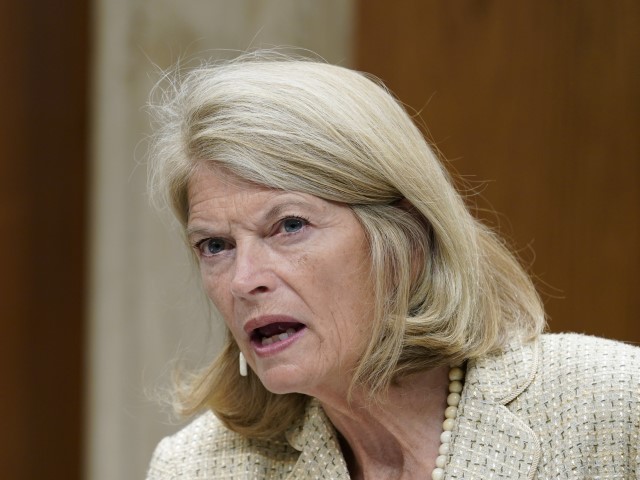Twenty-one year incumbent Sen. Lisa Murkowski’s (R-AK) best chance of defeating Trump-endorsed candidate Kelly Tshibaka could be Democrat voters.
Similar to how Rep. Liz Cheney (R-WY) tried to benefit from Democrat votes in her primary election loss, pro-impeachment Murkowski’s best hope of winning reelection against Tshibaka could be the opposition party.
Preliminary primary voting numbers from August 16 indicate Democrats could have contributed up to 30 points to Murkowski’s five point edge over Tshibaka (44.6 – 39.3 percent).
The Democrat vote could be just as impactful come November. J. Miles Coleman, the associate editor of Sabato’s Crystal Ball at the University of Virginia Center for Politics, estimated Tshibaka and Murkowski combined for about 85 percent of the open primary vote in which Democrats participated. That is because Alaska has open primaries ahead of a four-way ranked-choice general election, and thereby Democrats were permitted to vote for Murkowski in the primary — and they could select Murkowski as their second choice in the ranked-choice system in November.
In total, Democrat candidates in the August 16 primary only received about 8.5 percentage points with 90 percent reporting. But Democrat candidates usually receive between 38 and 40 percent of the general election vote in the largely conservative state, Tshibaka told Breitbart News in August. Coleman estimated the difference can add up to “a sign that Democrats may have supported Murkowski en masse.”
The combined 85 percent of the vote between Murkowski and Tshibaka with an estimated 38 to 40 percent overall turnout for Democrats in November suggests Democrats could account for a significant portion of the pro-Murkowski vote — perhaps roughly up to 30 points — depending on Democrat turnout and how Democrats vote in the ranked-choice voting system.

Sen. Lisa Murkowski (R-AK) questions Interior Secretary Haaland during a Senate Appropriations subcommittee hearing on the budget, Wednesday, July 13, 2022, on Capitol Hill in Washington. (Mariam Zuhaib/AP)
The way Alaska’s ranked-choice general election and open primary system works is as follows: All candidates from all parties appear on the ballot together in the August primary. The top four vote-getters regardless of party then advance to the general election, and there voters are given the opportunity to pick their top choice, as well as their second and third choices. If no candidate in the first round of voters’ first choices gets 50 percent of the vote, the last place candidate’s second choices are distributed across the remaining three candidates to see if someone can get across the majority threshold. If that fails again to produce a majority vote-getter, then a third round is conducted where the third place candidate’s votes are redistributed according to second choices between the remaining two candidates.

Senate candidate Kelly Tshibaka speaks ahead of former President Donald Trump during a “Save America” rally campaigning in support of republican candidates in Anchorage, Alaska on July 9, 2022. (PATRICK T. FALLON/AFP via Getty Images)
In other words, Tshibaka’s best bet is probably to win outright with more than 50 percent in the first round as the votes of the other GOP candidate Buzz Kelley and Democrat Patricia Chesbro will likely be redistributed in subsequent voting rounds. If Tshibaka and Murkowski are both under 50 percent in the first round, and again after a second round when Kelley’s votes get redistributed, then Democrat Chesbro’s voters may very well decide the election — and one would think, given Murkowski’s anti-Trump pedigree, that they would be much more likely to vote for Murkowski than Tshibaka.
FiveThirtyEight polling supports the possibility that Murkowski’s best chance of staying in power is to be allied with Democrat voters. Sixty-two percent of Democrats approved of Murkowski in July, while only 41 percent of Republicans did, down from 76 percent in 2021.
Questions arise as to why Democrats would vote for the 21 year incumbent Republican. Along with siding with Sen. Mitch McConnell (R-KY) on a few issues, the unwieldy senator was the tie-breaking vote to confirm Secretary of the Interior Deb Haaland, who has been bad news for the Alaskan economy. “Murkowski has shown that on important issues, neither side can trust her,” Tshibaka’s campaign adviser Tim Murtaugh told Breitbart News.
“Alaskans are outraged at Joe Biden’s attacks on their energy jobs, which has resulted in astronomical fuel prices, and they’re furious that Lisa Murkowski cast the tie-breaking vote to advance the nomination of energy-annihilating Interior Secretary Deb Haaland,” Murtaugh explained.
Tshibaka also told Breitbart News in August that Alaskan voters cannot trust Murkowski because she is two-faced. “She doesn’t tell us the truth. She says one thing here in Alaska and then does the exact opposite in D.C.,” Tshibaka said.
Murkowski has voted with Senate Democrats ten times in the last two years. Those votes include (1) Gun Control, (2) Corporate Bailout, (3) Confirmation of Justice Ketanji Brown Jackson, (4) $1.5 Trillion Omnibus Spending, (5) Federalize Local Elections, (6) $1.2 Trillion “Infrastructure” Bill, (7) Confirmation of Associate Attorney General Vanita Gupta, (8) Confirmation of DHS Secretary Alejandro Mayorkas, (9) Confirmation of Haaland, and (10) Impeachment of Trump.
Murtaugh slammed Murkowski’s voting record as simply just “trying to please the D.C. insiders.”
“Murkowski has gotten more liberal over the years, now siding with and working with Joe Biden almost all the time,” Murtaugh said. “She claims to support the 2nd Amendment, but voted for Joe Biden’s gun control bill. She claims to be pro-choice on abortion, but voted against codifying Roe v. Wade. Democrats in Alaska have a true progressive candidate in Pat Chesbro who will be a dependable liberal so they don’t even have to bother with Murkowski, whom they’ve never supported before.”
Follow Wendell Husebø on Twitter @WendellHusebø. He is the author of Politics of Slave Morality.

COMMENTS
Please let us know if you're having issues with commenting.